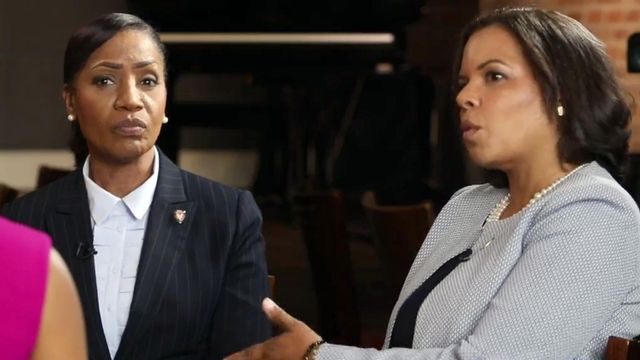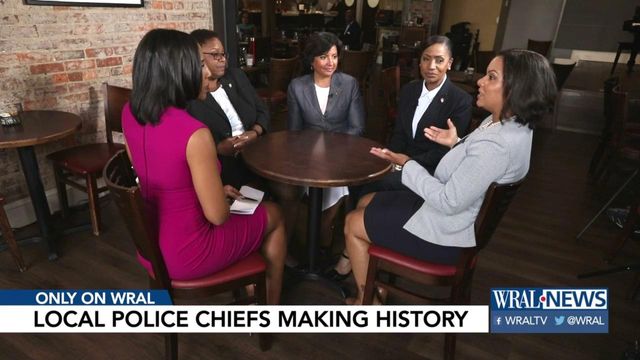Six black women leading major NC police departments make history
For the first time in North Carolina history, there are six female, African-American police chiefs, and they're relishing the opportunity to serve together.
Posted — UpdatedFour of them are in the Triangle: Raleigh's Cassandra Deck-Brown, Durham's CJ Davis, Morrisville's Patrice Andrews and Fayetteville's Gina Hawkins. Catrina A. Thompson leads Winston-Salem's police department and Bernette Morris is the chief in Morehead City.
"When I walked in today, I had to just stop for a second because I saw these women, and I thought, 'Let me just soak it in,'" Andrews said when the four chiefs met for an interview with WRAL News.
From the first day of police academy, the chiefs said, they quickly got a reality check that they would have to work twice as hard to get through because they were women. Deck-Brown's class at the Raleigh Police Department had only four women, which she says was a record at the time.
"We've broken a glass ceiling," Deck-Brown said. "So, becoming chief, the honor is knowing that somebody else has that opportunity to get there."
Davis and Hawkins started out at the Atlanta Police Department, where they said racial diversity wasn't a problem, but there were only a handful of women.
Being two of only a few women made Davis and Hawkins feel like they had something to prove.
"Even far into our careers, it was always a proving game," Davis said.
The same was true for Andrews.
"There was a proving ground," Andrews said. "It wasn't because I was a black woman. It was because I was a woman, and I think (everyone just wanted) to see, 'What is she really made of?'"
Their first calls on duty shaped the type of officers they'd become. Both Hawkins and Deck-Brown dealt with death. Deck-Brown said she realized how a family grieves when a loved one dies, and Hawkins found how empathy in the face of death shows an officer's humanity.
"She was saying, 'Lord, thank you for the time that you gave us (with) our baby,' which was six months," Hawkins said. "In the time of their most desperate hurt, she was giving God praise. I couldn't hold it in at that point. My eyes were going, and I was thinking, 'I'm supposed to be hard, but I don't care. You know what, I'm with her.'"
On the other side, though, Davis laughs about her first call.
She was by herself and had to remove an irate, intoxicated man from a grocery store bathroom stall. She said the man had empty beer cans scattered around his feet, which he had stolen from the store.
"I had to deal with it in a way where I didn't want to have a physical confrontation with him," Davis said. "He was already drunk, and I knew I had to be savvy enough to get him out to prove to my co-workers that I could do this job."
Each chief said compassion, empathy, communication and quick-thinking earned them their jobs at the top of their departments. Those traits are part of a shift in how police deal with their communities.
"This is a paradigm shift in policing," Deck-Brown said. "This is what 21st century (policing) looks like. All we need is the opportunity. Some do it better than others, but we need the opportunity."
It's an opportunity they relish sharing with each other.
"Know that it's not just happening here," Andrews said. "It's happening in Dallas, in Portland – it's all over. It's happening all over, and I just tell you, I love the black girl magic."
• Credits
Copyright 2024 by Capitol Broadcasting Company. All rights reserved. This material may not be published, broadcast, rewritten or redistributed.






